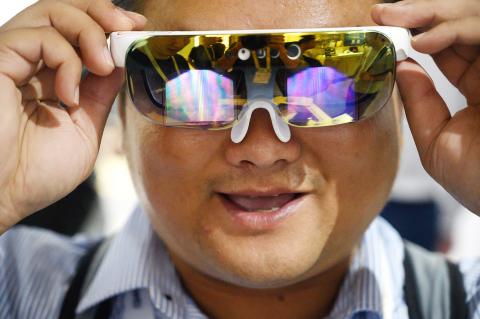Huawei Technologies Co’s (華為) founder intends to launch a three-to-five-year overhaul of the networking giant, creating an “iron army” that can help it survive a US onslaught, while protecting its lead in next-generation wireless.
Major structural shifts are around the corner as US sanctions threaten the survival of its cash-cow smartphone business, Ren Zhengfei (任正非) warned in an internal memo seen by Bloomberg News and verified by a Huawei spokeswoman.
The consumer business faces a “painful long march,” Ren wrote, a possible reference to the Chinese Communist Party’s historic cross-country trek.

Photo: AFP
China’s biggest technology company is grappling with an existential threat after Washington blocked Huawei from buying US technology, cutting off vital components from Qualcomm Inc chipsets to Google’s Android operating software.
Ren, 74, said an internal revamp is needed to meet war-time needs, meaning that organizations deemed unnecessary or redundant would be removed.
He did not provide details about how such a restructuring might unfold.
“We have to complete an overhaul in harsh and difficult conditions, creating an invincible iron army that can help us achieve victory,” Ren wrote in the letter dated Aug. 2. “We absolutely have to complete this reorganization within three to five years.”
Ren, a former engineer with the People’s Liberation Army, has a penchant for militaristic language. The entrepreneur has spoken previously about a “strategic withdrawal” from certain markets in response to escalating US scrutiny.
Huawei itself has not been clear about how the curbs set in place by US President Donald Trump’s administration would affect its about 190,000 employees worldwide, but the company has begun to lay off US-based staff, the Wall Street Journal has reported.
Huawei on Friday last week unveiled its in-house HarmonyOS, saying that it can replace Android if Google’s software is barred from its future smartphones.
However, Ren said that the company needed a lot more time to build an apps ecosystem, a major requirement for any operating software to thrive in the long run.
“Two bullets fired at our consumer business group unfortunately hit the oil tanks,” Ren said in his letter, without elaborating.
Still, Ren talked about Huawei’s edge against the US in 5G telecommunication technologies.
“The US doesn’t use the most advanced 5G technology,” the Huawei founder wrote. “That might leave it lagging behind in the artificial intelligence sector.”

Intel Corp chief executive officer Lip-Bu Tan (陳立武) is expected to meet with Taiwanese suppliers next month in conjunction with the opening of the Computex Taipei trade show, supply chain sources said on Monday. The visit, the first for Tan to Taiwan since assuming his new post last month, would be aimed at enhancing Intel’s ties with suppliers in Taiwan as he attempts to help turn around the struggling US chipmaker, the sources said. Tan is to hold a banquet to celebrate Intel’s 40-year presence in Taiwan before Computex opens on May 20 and invite dozens of Taiwanese suppliers to exchange views

Application-specific integrated circuit designer Faraday Technology Corp (智原) yesterday said that although revenue this quarter would decline 30 percent from last quarter, it retained its full-year forecast of revenue growth of 100 percent. The company attributed the quarterly drop to a slowdown in customers’ production of chips using Faraday’s advanced packaging technology. The company is still confident about its revenue growth this year, given its strong “design-win” — or the projects it won to help customers design their chips, Faraday president Steve Wang (王國雍) told an online earnings conference. “The design-win this year is better than we expected. We believe we will win

Quanta Computer Inc (廣達) chairman Barry Lam (林百里) is expected to share his views about the artificial intelligence (AI) industry’s prospects during his speech at the company’s 37th anniversary ceremony, as AI servers have become a new growth engine for the equipment manufacturing service provider. Lam’s speech is much anticipated, as Quanta has risen as one of the world’s major AI server suppliers. The company reported a 30 percent year-on-year growth in consolidated revenue to NT$1.41 trillion (US$43.35 billion) last year, thanks to fast-growing demand for servers, especially those with AI capabilities. The company told investors in November last year that

Power supply and electronic components maker Delta Electronics Inc (台達電) yesterday said it plans to ship its new 1 megawatt charging systems for electric trucks and buses in the first half of next year at the earliest. The new charging piles, which deliver up to 1 megawatt of charging power, are designed for heavy-duty electric vehicles, and support a maximum current of 1,500 amperes and output of 1,250 volts, Delta said in a news release. “If everything goes smoothly, we could begin shipping those new charging systems as early as in the first half of next year,” a company official said. The new